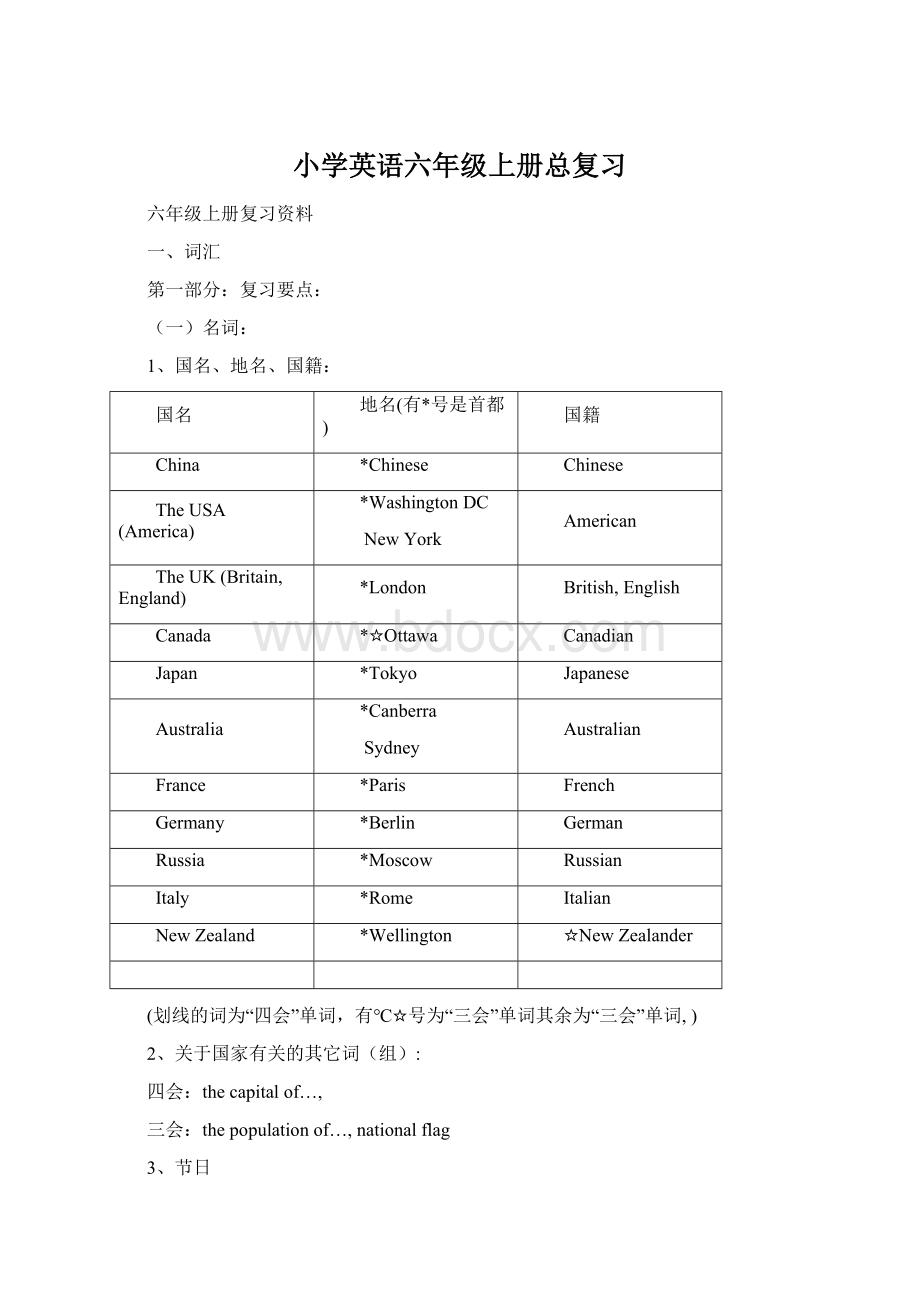小学英语六年级上册总复习Word下载.docx
《小学英语六年级上册总复习Word下载.docx》由会员分享,可在线阅读,更多相关《小学英语六年级上册总复习Word下载.docx(33页珍藏版)》请在冰豆网上搜索。

German
Russia
*Moscow
Russian
Italy
*Rome
Italian
NewZealand
*Wellington
☆NewZealander
(划线的词为“四会”单词,有℃☆号为“三会”单词其余为“三会”单词,)
2、关于国家有关的其它词(组):
四会:
thecapitalof…,
三会:
thepopulationof…,nationalflag
3、节日
festival,SpringFestival,Christmas,
Mid-autumnFestival,DragonBoatFestival,Halloween,Easter
4、食品:
dumpling
mooncake,zongzi,dimsun,
5、饭餐:
meal,breakfast,lunch,dinner
6、自然界
river,mountain,hill,lake
7、其它:
clothes,problem,CD,VCD,doll,bookstore,history,question,turn,
pearl,temple,adult,stocking,voice
(二)代词:
any
no
every
thing
anything
nothing
everything
body
anybody
nobody
everybody
one
anyone
noone
everyone
(三)形容词(组):
1、国家的,…民族的:
China,Chinese,American,British,English,Canadian
French,German,Japanese,Italian,Australian
2、其它:
dirty,excellent,noisy,quiet,bored,boring,poor,free,busy,less,same,lucky,same,different,alotof,lotsof
crowded,stupid,afraid,western,popular,
(四)数词:
四会:
hundred,thousand
million
(五)动词(组):
havebeento,gofishing/boating/swimming/shopping,love(ourcountry),cometotea,invite(me,ourteacher),askfor,bring(methebook),answer
thequestion,hear(me,theteacher),fell(happy),haveameal,bedifferentfrom,finish(theexercise,one’shomework),phone(me,him),waitfor(me,them),sounds(good,beautiful),goaway,hope,seeyoulater,
goonthePearlRiverCruise,takeamessage,dial,haveapicnic,gooutside,haveaproblem,markthehomework,decorate(thehouse,theChristmastree),rowtheboat
(六)表示时间的词或短语:
today,tonight,thedayaftertomorrow,thedaybeforeyesterday,inthemorning(afternoon,evening),atnight,for(anhour),during(thefestival,holiday),
第二部分:
练习
1.Writetherightverbformafterthemodel.仿照例子,写出动词的形式。
Model:
dodoing,does,did
(1)fell_________________________________________
(2)go_________________________________________
(3)get_________________________________________
(4)play_________________________________________
(5)have_________________________________________
(6)come_________________________________________
(7)run_________________________________________
(8)work_________________________________________
(9)say_________________________________________
(10)take_________________________________________
(11)see_________________________________________
(12)study_________________________________________
(13)give_________________________________________
(14)write_________________________________________
(15)swim_________________________________________
(16)love_________________________________________
2.WritethenumberinEnglish.用英文写出下面的数字:
(1)1,256,893____________________________________________________
(2)26,980,000____________________________________________________
(3)795,490,863_____________________________________________________
(4)104,378,873____________________________________________________
3.Fillintheblankswiththerightletters.根据提示,写出句子所缺的单词。
(1)WeusuallygooutonSunday.ButlastSundaywedidn’tgoout.Westayat
homei__________.
(2)Didyoug__________fishingorg__________boatingyesterday?
(3)It’scoldoutside.Maryiswearingalotofc___________.
(4)LastSaturdaymyparentsandIclimbedthem___________.
(5)Romeisthec___________ofItaly.
(6)Theyw___________leavetomorrow.Theywillstayhere.
(7)Wouldyouliketoc___________totea?
(8)Iama__________heisn’tinthehouse.
(9)Weboughtalotofbooksintheb___________thismorning.
(10)Chinahasaverylongh___________.
(11)Couldyouanswermyq___________?
(12)Wehavethreem_________everyday,breakfast,lunchanddinner.
(13)Thisdollisd__________fromthatone.
(14)MissLiiswaitingf__________us.
(15)Helpy___________tothemeat.
4.Fillintheblankwiththerightadjectiveafterthemodel.仿照例子用适当的划线部分的词的反义词填空。
Thedollisn’texpensive.It’scheap.
(1)Timisn’ttallerthanme.He’smuch___________thanme.
(2)That’snotanoisycity.It’svery___________.
(3)Thetowtoysarenotthesame.Theyare___________.
(4)It’sverycoldhere,butinAustraliait’svery__________now.
(5)Thecatisjumpingupand___________.
(6)Hewasn’tgoodatplayingthepiano.Hewas___________doingatit.
(7)Themanplayedthepianobadly.Butheplaystheguitarvery_________.
(8)Thestudentsarenotfree.Theyare__________.
(9)Theblackpigiscleanerthanthewhitepi.Thewhitepigismuch__________thantheblackpig.
(10)Hedidn’tdoitbeforethat.Hedidit___________that.
5.WritethewordsinEnglish.把下面的词组翻译成英语。
(1)春节________________________________
(2)挨家挨户________________________________
(3)在地面上________________________________
(4)等候他们________________________________
(5)回答问题________________________________
(6)去游泳________________________________
(7)一场足球比赛________________________________
(8)一座安静的城市________________________________
(9)一间嘈杂的课室________________________________
(10)玩得开心________________________________
(11)一件著名的饭店________________________________
(12)读点书________________________________
二、句型、语法
1.你了解这些语法知识吗?
你能运用在实际中运用这些语法知识吗?
(1)句子的构成可包括含tobe,therebe,todo的肯定式、否定式、一般疑问式。
Tobe:
肯定句
否定句
一般疑问句
一般现在
Iam…
We/You/Theyare…
He/She/Itis…
Iamnot…
We/You/They
aren’t…
He/She/Itisn’t…
AmI…?
Arewe/you/they
…?
Ishe/she/it…?
一般将来
Iwillbe(am
goingto
be)…
We/You/Theywill
be(aregoingto
He/She/Itwillbe
(isgoingto
Be)…
Iwon’tbe
(amnotgoing
tobe)…
We/You/They
won’tbe
(aren’tgoing
tobe)…
He/She/Itwon’t
be(isn’tgoing
tobe)…
Will/Shallwe/I…?
AmIgoingtobe
Willyou/we/they/
he/she/it…?
Willyou/we/they
be…?
Arewe/they/you
goingtobe…?
Ishe/she/itgoing
tobe?
一般过去
I/He/She/Itwas…
We/You/Theywere…
I/He/She/Itwasn’t
…
We/You/Theyweren’t…
WasI/he/she/it…?
Werewe/you/they
Therebe:
Thereis/are…
Thereisn’t/aren’t...
Is/Arethere…?
Thereis/aregoing
tobe…
Therewillbe…
Thereisn’t/aren’t
goingtobe…
Therewon’tbe…
Willtherebe…?
Aretheregoingto
…?
Iwas…
He/She/Itwas…
Was/Werethere…?
Todo(行为动词以work为例)
I/We/You/Theywork…
He/She/Itworks…
I/We/You/Theydon’t
work…
He/She/Itdoesn’t
DoI/you/we/they
work…?
Doeshe/she/it
现在进行时
Iamworking…
We/You/Theyare
working…
He/She/Itis
Working…
Iamnotworking
We/You/Theyaren’t
He/She/Itisn’t
AmIworking…?
Areyou/we/they
working…?
Ishe/she/it
I/We/You/He/She/It/Theywillwork
…
I’mgoingtowork
We/You/Theyare
goingtowork…
He/She/Itisgoing
towork…
I/We/You/He/She/It/Theywon’twork…
I’mnotgoingtowork…
goingtowork…
He/She/Itisn’tgoingto
work…
WillI/we/you/
they/he/she/it
work…?
AmIgoingto
goingtowork
Ishe/shegoingto
I/We/You/They/He/
She/Itworked…
She/Itdidn’twork…
DidI/we/you/they/
/he/she/itwork
(2)读下面的特殊疑问式的句子,你能总结一些特殊疑问句的构成的规律吗?
I.
Wholivesthere.
Whoissingingintheroom?
Whowasathomeyesterday?
II.
Whatdoeshedo?
Whatishedoing?
Whatdidtheydo?
Whendoesheusuallygetup?
Whendidshehavedinneryesterday?
Whereishenow?
Wherearetheyplantingtrees?
Wheredidtheyplayfootball?
Howisyourmother?
Howishecoming?
Howdidtheygetthere?
Whydoeshegothere?
Whydidshegothere?
III.
Whosebookisthis?
Whoseparentsarecominghere?
Whichbookisyours?
Whichpresentsdidhegiveyou?
2.关于形容词、副词的比较级和最高级
(1)你知道形容词、副词的比较级和最高级构成的一些规律吗?
A.一般情况下加-er,-est:
long–longer,longest;
small–smaller,smallest
B.重读闭音节,双写最后一个字母再加-er,-est:
big–bigger,biggest;
hot–hotter,hottest
C.辅音字母加y,改作后一个字母y为i再加-er,-est:
funny–funnier,funniest,lucky–luckier,luckiest
D.部分双音节和多音节词,加more,most:
slowly–moreslowly,mostslowly;
moredelicious,mostdelicious
E.不规则变化:
good–better,best;
bad–worse,worst
(2)你知道形容词、副词的比较级和最高级句子的构成吗?
A.Thisbookisnewerthanthatone.
TheEnglishbookisthenewestofthethree.
MikerunsfasterthanJohn.
Mikerunsfastestinhisclass.
B.Thisflowerismorebeautifulthanthatone.
Thistreeistheoldestinthepark.
Thegirlisswimmingbetterthanthegirl.
Jimswimsbestinhisgroup.
C.Snakesaremoredangerousthanfrogs.
Themeetingisthemostimportant.
Theoldmanwalksmoreslowlytheyoungman.
Katejumpshighestinherclass.
D.TimhasmorebooksthanJim.
Timhasthemoststampsinhisclass.
3.关于代词some-,any-,no-,every-:
(1)some-多用在肯定句表示请求得到某些东西的句子:
Someonewillcomehere.
Wouldyoulikesomethingtoeat.
(2)any-多用于疑问句或否定句:
Isthereanythinginthebox?
Wedon’twanttoseeanyoneofthem?
(3)no-是事实的否定:
Thereisnothingintheroom.
Nobodycandothat.
(4)代词some-,any-,no-,every-语法上看成是第三人称单数:
Thereissomethinginthebottle.
Everyonelikesit.
1.Rewritethefollowingsentencesafterthemodel.按要求改写下面的句子。
Theyoungmenareplayingfootball.(basketball)